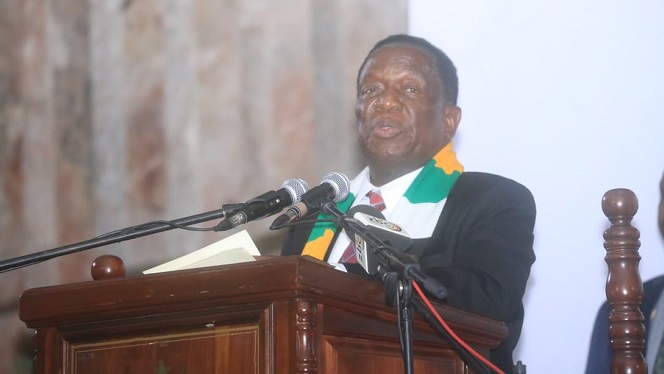
The Sunday Mail

Sunday Mail Reporter
Zimbabwe needs to tap into its legacy of self-belief and determination to win the fight against sanctions and to prosper communities and the nation “under the adverse conditions they create”, President Mnangagwa has said .
This is so that countries that imposed the embargo can “hear and respect us”.
The President said agitation alone, as well as periodic appeals, will not deliver Zimbabwe’s quest for full sovereignty and self-determination.
Next week, on October 25, the region will commemorate the Anti-Sanctions Day, which was set aside by SADC to lobby the international community to rally behind the call for lifting sanctions on Zimbabwe.
In his weekly column for The Sunday Mail, the President said by achieving food security, which has seen the country on the cusp of exporting wheat after a projected record wheat harvest this year, the country had achieved a key milestone in the struggle against illegal sanctions.
“To win this fight against illegal sanctions, we must fully believe in ourselves and in our capabilities as a people. That vital sense of self-belief, buttressed by national unity and solidarity from friends and allies, makes us invincible,” President Mnangagwa said.
“From the early phase of our struggle for independence, we now know that agitation alone, interspersed with periodic appeals delivered from rostrums of international forums like the United Nations, will not deliver on our quest for full sovereignty and self-determination.
“Our enemies need a lot more than sheer pleas and persuasion. They need to see us forging ahead in spite of their sanctions, to hear and respect us. We have to show real determination to beat those sanctions, and to prosper our people and nation under the adverse conditions they create.”
He said the Second Republic was now on the verge of translating land acquisition — delivered by the First Republic — into a “new, indigenous-driven economy which durably delivers on food security”.
The President said it was impossible for Zimbabwe, which boasted vast national resources and an educated and hardworking populace, to be at the mercy of sanctions that were meant to collapse the economy.
“Our decision to reorganise ourselves internally in order to withstand more effectively those heinous sanctions has restored agency and given us initiative, thus helping us throw off the debilitating badge of victimhood and helplessness,” he said.
“Simply acquiescing to external pressure is against our DNA and goes against our heroic experience as a people who survived and successfully resisted colonialism for over a century.”
Some countries that had chosen to be hostile to Zimbabwe, the President added, are increasingly realising their folly, as the country had the world’s sought-after mineral resources that are critical in transitioning to a green economy.
“We are, thus reckoned as a key player in the global transition to a green, non-carbon economy, Those countries which have chosen to be hostile to us are increasingly realising that there is more to be gained through positive bilateral cooperation than through unmerited, unilateral hostility. That new realisation is weakening the broad Western front forged in the past to impose sanctions against us.”
He said the country’s ultimate goal is to build an industrial economy supported by local resources.
It is believed that Government’s economic diplomacy and ease of doing business reforms are progressively winning over global capital and key technologies needed to get the maximum possible value from local resources.
The diaspora and institutions of higher learning, among others, President Mnangagwa added, had a role to play in harnessing local capacities needed to develop the country, regardless of the obtaining coercive measures.
The Harare Institute of Technology, for example, recently developed a solution that will help the country to produce lithium batteries, while the Bindura University of Science Education had established a plant that will manufacture water purification chemicals.
The President thanked SADC, particularly the late United Republic of Tanzania President, John Magufuli, who, as chairperson of the regional bloc then, initiated the decision that led to the landmark adoption of October 25 as Anti-Sanctions Day.



